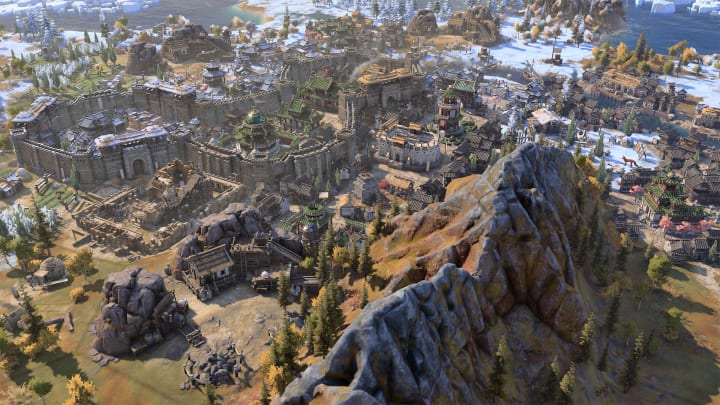Civilization 7: All details from the Antiquity Age dev livestream

Firaxis broadcast its first developer livestream for Civilization 7 on September 12, 2024, showcasing gameplay from the Antiquity Age with Augustus Caesar and Rome as well as Ashoka and Maurya India. They also gave us a first look into the transition between Antiquity Age and Exploration Age – plus, Greece has been revealed as a new civilization for Antiquity and Amina as a new leader.
We’ve taken notes during the livestream to collect all the important points made by the devs, so you can find all highlights from the Civilization 7 Antiquity Age livestream below.
- First unit in the Antiquity Age is built in one turn and you can choose between Scout and Warrior.
- Terrain like forests, wetlands, and rough ground now ends movement, though some units have abilities to ignore those rules.
- There will be different options for the dogs accompanying the Scout. Scouts have a search skill that reveals the area around them as well as a permanent lookout skill to observe an area.
- Goodie Huts are now Discoveries, which are attached to little narrative events letting you decide on which rewards to get.
- You can replace rural tiles with urban tiles, getting that population back and placing it somewhere else.
- Eurekas/Inspirations are not in the game in their previous form. They won’t provide any boosts. Similar mini-goals do still exist, but they appear as narrative quests players can accept to earn some rewards. Such narrative quests can be connected to leaders or civilizations.
- Government type will change the Celebration reward choices you get from reaching a certain Happiness threshold. Celebrations also provide Social Policy slots.
- Influence is a resource used for most diplomatic actions. Some diplomatic actions (Endeavors and Sanctions) depend on the traits of your leader.
- Every Civ has its own theme in the OST.
- Walls are built separately in urban districts. Conquering a city requires you to occupy all of them.
- Combining certain buildings in a single district creates special districts with additional bonuses, which are unique for certain civilizations.
- Towns can be specialized to Farming, Fort, Mining, or Trade Towns, generating different yields for your actual cities.
- Commanders have different promotion trees (Bastion, Assault, Logistics, Maneuver, Leadership) you can invest in. Commanders respawn if killed, though it takes some time. They have replaced Great Generals.
- Great People are now unique to certain civilizations. You no longer compete for Great People with others.
- Milestones are part of the Legacy Paths and provide bonuses for the development of your empire throughout the ages, giving you Legacy Points to invest in before the next Age.
- Exceeding the city limit incurs Happiness penalties, but you can do it – it’s a soft cap.
- Specialists boost the yields of tiles they’re played on.
- Amina is a confirmed leader. She ruled the city-state of Zazzau in what is today Nigeria.
- War Weariness is a new mechanic.
- Settlers are no longer captured immediately when attacked, they have an HP bar and a combat value to defend themselves. Settlers now get destroyed and can no longer captured.
- Resources can be allocated to cities, which have a certain number of slots for them based on their size. Certain resources have better effects on the capital, normal cities, or towns.
- Every civilization has a unique wonder that’s unlocked through different ways, such as by advancing through their Civic Tree.
- In the Age Transition, you get to invest all of your Legacy Points into perks and choose your new civilization. It looks like you can unlock up to a dozen choices through history, your leader, and gameplay.
- Dark Age perks can appear if you don’t complete Milestones on your Legacy Paths, similar to Golden Age perks that appear if you complete all Milestones on a Legacy Path.
- Greece confirmed as a civilization for the Antiquity Age.
- Some of your architecture as well as your Social Policy Traditions are carried forward into the new Age.
- The number of tiles a city can expand onto and work is the same as in Civilization 6, just like the number of tiles that has to separate cities is the same.
- Roads get created between cities automatically, as long as they are within a certain distance. Merchants can also create roads through trade routes.
You can check out the full stream on YouTube:
For more information on the game, read our interview with Civilization 7 executive producer Dennis Shirk from Gamescom 2024 about all the changes coming to the series and find all confirmed Civilization 7 leaders and civs on our list.
